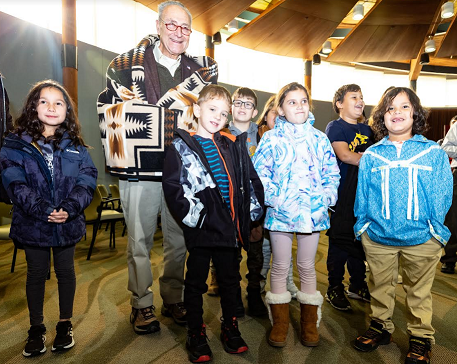
- Details
- By Native News Online Staff
Seneca Nation President Rickey Armstrong, Sr. welcomed U.S. Senate Majority Leader Charles E. Schumer to the Nation’s Allegany Territory, Irving, New York on Wednesday, November 23, 2022, Sen. Schumer announced a major federal grant to support a significant economic initiative that will enhance accessibility and streamline transportation service on the Seneca Nation.
The Seneca Nation was selected to receive a federal grant of $7,625,000 through the highly competitive Rebuilding American Infrastructure with Sustainability and Equity (RAISE) program. The grant will fund the construction of the Southern Tier Regional Transit Hub, a state-of- the-art, transit facility comprised of a combined transit hub and bus storage facility on the Nation’s Cattaraugus Territory.
Operated by the Seneca Nation Department of Transportation and Seneca Transit System, the facility will increase accessibility, streamline bus services and fuel economic growth across the region.
The Southern Tier Regional Transit Hub is intended to support the expansion of transit services for the Seneca Transit System and regional partners. The transit hub will serve as a transfer facility at which riders will be able to connect to buses that provide regional transit services like Seneca Transit System, Chautauqua Area Regional Transit System (CARTS), Niagara Frontier Transportation Authority (NFTA), and other transit services that visit and bring tourism to the area, making it easier for local residents and visitors alike to easily travel to other major hubs.
“Access to reliable transportation is an important tool in helping to bridge socio-economic gaps that exist for many of our people, which can be particularly challenging in rural communities. Our Seneca Transit System is a vital service that connects Senecas on our Cattaraugus and Allegany Territories to healthcare, employment, commerce, recreation and other needs on our territories and within the greater region.The Sothern Tier Regional Transit Hub, funded by this RAISE grant, will be a transformational addition to that effort,” President Armstrong said. “As important, this project will serve as a gateway for improved access and connectivity throughout the region, establishing a safe, convenient and efficient link, whether people are traveling to or from Buffalo and Niagara Falls, the Chautauqua region, Cattaraugus County, or our Seneca territories.”
“For far too long our tribal communities have had to face inadequate public transit options due to a lack of federal assistance, that is why I am proud to deliver this over $7 million investment for the Seneca Nation’s Cattaraugus Territory to create a hub for transit services and build a more equitable transportation future,” Senator Schumer said. “The Seneca Nation’s families, businesses, and communities need and deserve a modern, easily accessible transit system, and this major federal investment, in tandem with our major wins from the Bipartisan Infrastructure & Jobs Law for our Tribal communities will pave the way for new economic growth, reconnect residents, create good paying jobs, and drive the future of transportation for the region.”
In addition to its accessibility and operational benefits, the facility will provide infrastructure for the potential electrification of the Seneca Transit System fleet, charging capabilities for other transit providers, and be sized for future growth of the Seneca Transit System. It will also allow the Nation to create new jobs and expand the Seneca economy.
The facility will be built on Nation-owned land near the Seneca One Stop fuel station and convenience store on Route 20 in Irving. Construction is targeted to start in 2024.
More Stories Like This
Native News Weekly (August 25, 2024): D.C. BriefsUS Presidents in Their Own Words Concerning American Indians
Native News Weekly (January 18, 2026): D.C. Briefs
Federal Judge Orders ICE to Halt Use of Pepper Spray, Arrests of Peaceful Protesters in Twin Cities
Tunica-Biloxi Cultural Leader John D. Barbry Walks On
Help us defend tribal sovereignty.
At Native News Online, our mission is rooted in telling the stories that strengthen sovereignty and uplift Indigenous voices — not just at year’s end, but every single day.
Because of your generosity last year, we were able to keep our reporters on the ground in tribal communities, at national gatherings and in the halls of Congress — covering the issues that matter most to Indian Country: sovereignty, culture, education, health and economic opportunity.
That support sustained us through a tough year in 2025. Now, as we look to the year ahead, we need your help right now to ensure warrior journalism remains strong — reporting that defends tribal sovereignty, amplifies Native truth, and holds power accountable.
 The stakes couldn't be higher. Your support keeps Native voices heard, Native stories told and Native sovereignty defended.
The stakes couldn't be higher. Your support keeps Native voices heard, Native stories told and Native sovereignty defended.
Stand with Warrior Journalism today.
Levi Rickert (Potawatomi), Editor & Publisher


